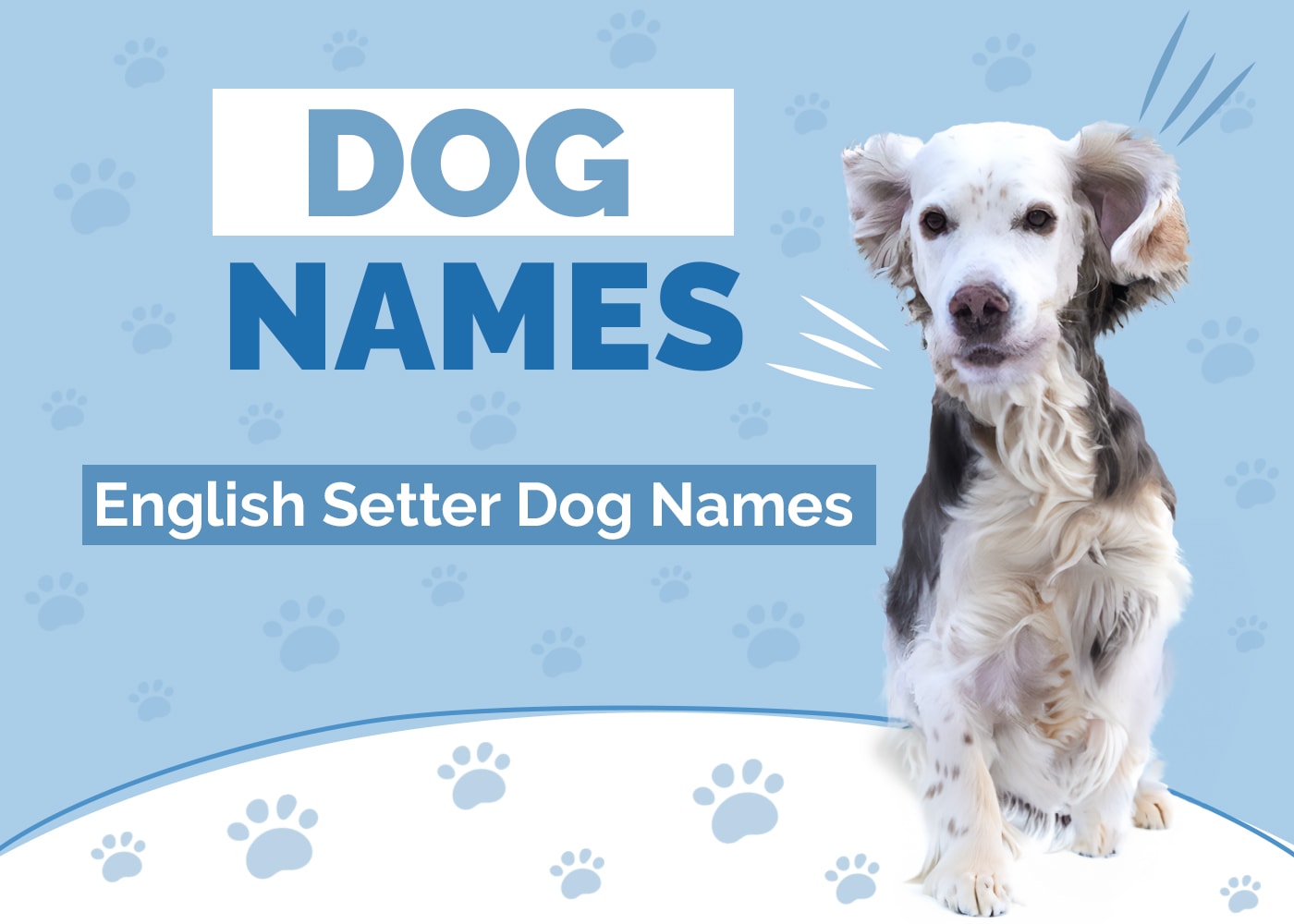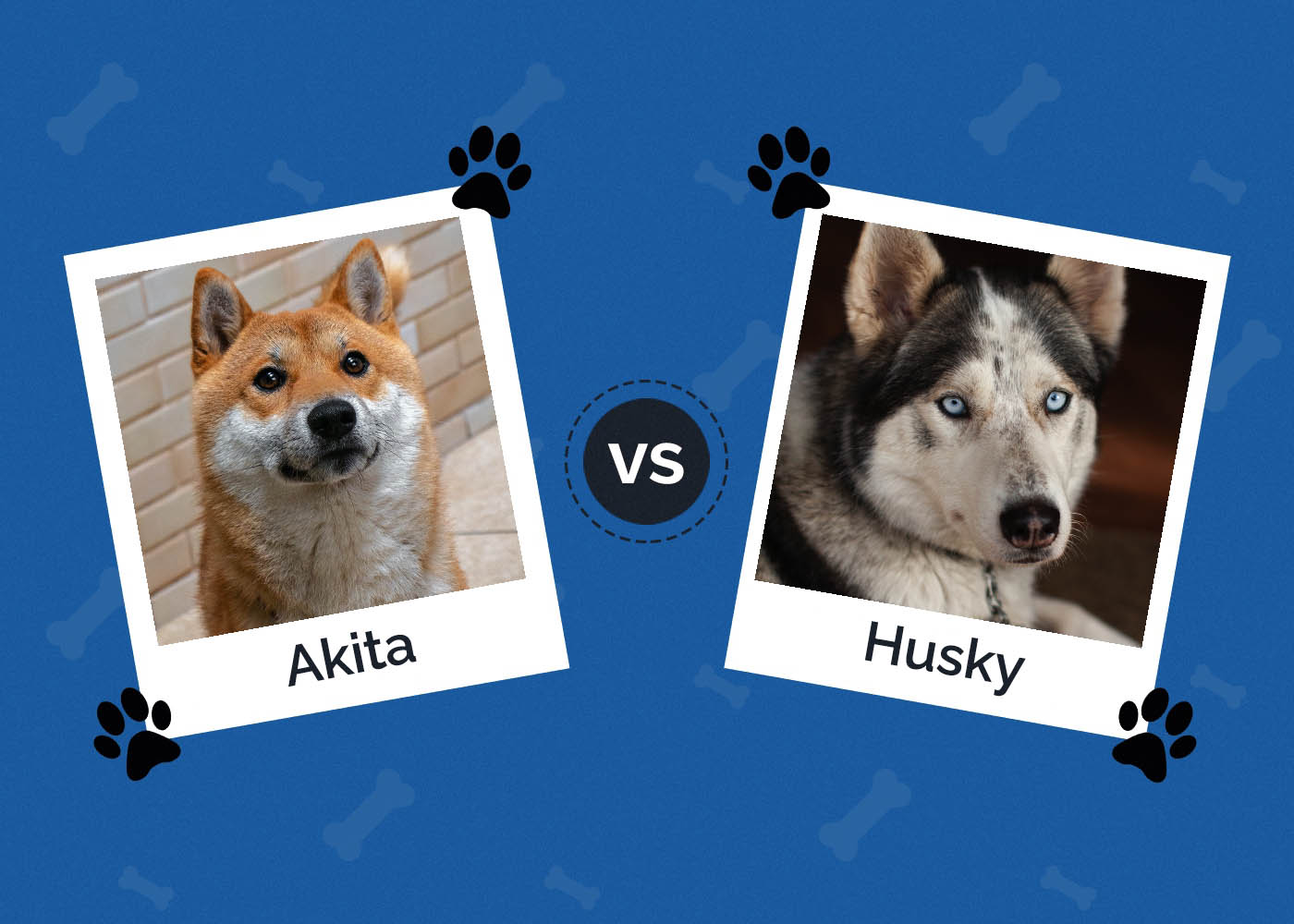How To Train a Pitbull Puppy Not to Bite (10 Expert Tips)
By Kit Copson
Updated on
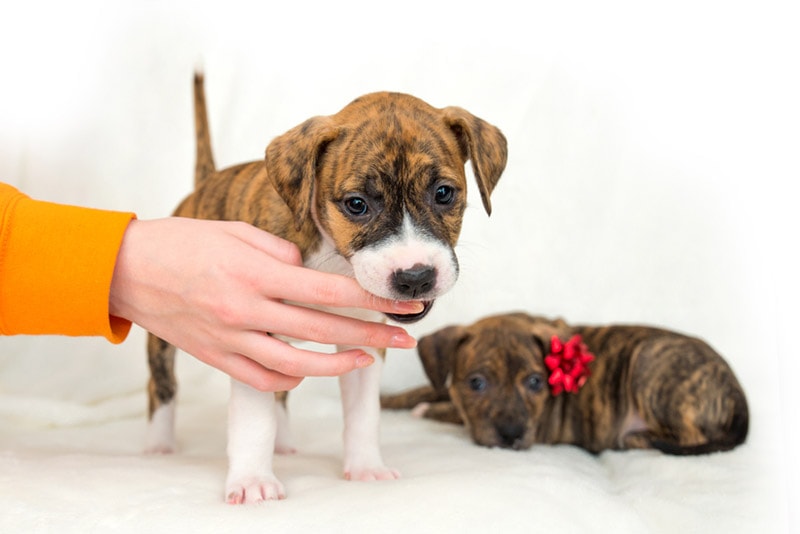
A crucial part of Pit Bull puppy training—just like with any other breed—is to ensure that they learn biting is unacceptable. Any dog can bite if they feel threatened or anxious, are in pain, or if they haven’t learned to play gently, but Pit Bulls are energetic, strong, and powerful dogs, so it’s a very bad idea to instill the idea that biting is okay, even if they’re just playing.
In this post, we’ll share some tips on training your Pit Bull bite inhibition from an early age to ensure this doesn’t become an issue when they grow up.
The 10 Tips for Training a Pitbull Puppy Not to Bite
1. Teach Bite Force Control
It’s completely natural for puppies to explore by chewing and nibbling on new and exciting things (sometimes, this can include you), but one of the most important things they need to learn is bite force control. There is a line that puppies should not cross—and that is biting down on you or another dog too hard.
If your puppy starts nipping or biting you during play, let out a high-pitched yelp like “ouch!”. This shows your puppy that they’ve gone too far, and the surprise of the sound should stop them in their tracks. Praise your puppy if they stop the biting behavior.
In some cases, however, high-pitched yelps can encourage the puppy to keep biting, so, if they don’t stop, walk away from the situation to signal that playtime is over. You could also try placing them in their crate to take some time to cool off.
2. Avoid Yelling
Though it can be frustrating when your Pit Bull puppy bites you, avoid yelling (except for that high-pitched “ouch!” we talked about) or punishing your puppy physically by smacking.
These responses actually teach the puppy that, if they bite you, you’ll give them some kind of attention—even the negative kind. It can also teach your Pit Bull to be afraid of you and associate you with negative emotions.
3. Withdraw
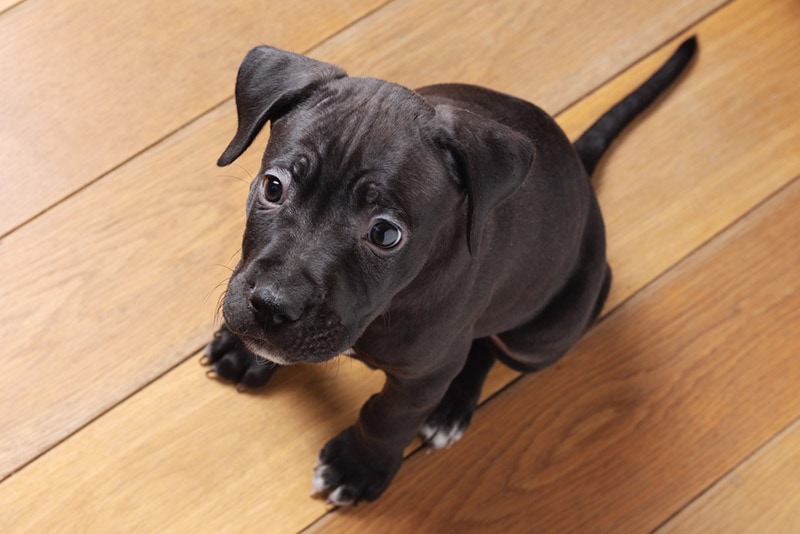
So, if your puppy is biting you and won’t calm down, what can you do instead of yelling or punishing? According to Kathy Santo, an AKC Family Dog columnist and dog trainer, it’s a good idea to turn away from your puppy and tuck your hands into your armpits to show the puppy that playtime is over and that you won’t tolerate being bitten.
4. Don’t Encourage the Behavior
Roughhousing (play fighting or wrestling) with your puppy is fine, as long as you are the one who initiates it and they’re not taking things too far by biting you. If your puppy has a tendency to bite or nip you when you’re roughhousing together, avoid roughhousing altogether.
While nipping and biting might not be that painful when your Pit Bull is a puppy, if they continue this behavior into adulthood, it could be very dangerous for both humans and other dogs.
5. Keep Your Puppy Stimulated
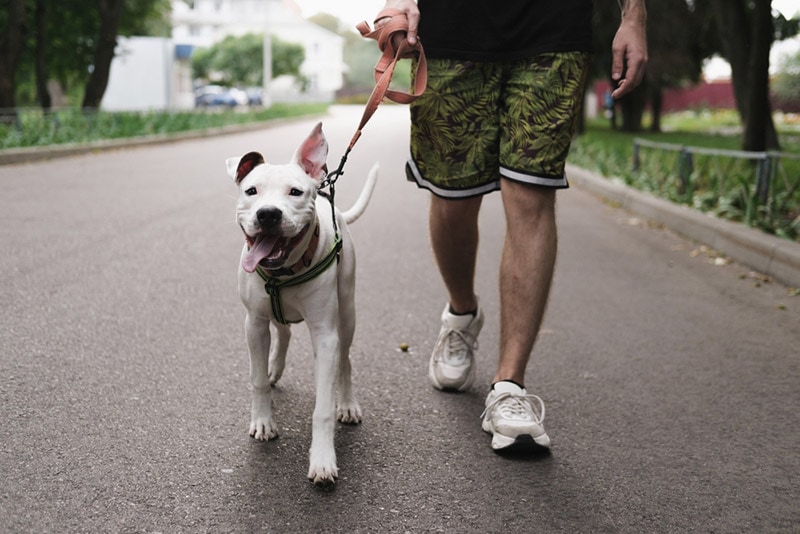
If your Pit Bull puppy is bored or has no way to release all that energy, they may bite during play simply because they’re getting too overstimulated. Make sure they’re getting enough physical exercise every day (walks, playtime, etc.) and have a variety of toys around your home to keep them busy when not out and about.
Rest and relaxation are also important for your Pit Bull puppy, so if they’ve had enough of playing, give them time to settle down on their bed or favorite spot for a snooze. This also gives you an opportunity to pop a treat in front of them to reward calm behavior!
6. Remove Your Puppy from Certain Situations
Say, for example, you’re out in the local dog park with your (fully vaccinated) Pit Bull puppy and they start playing with other dogs. This is great because puppies learn bite inhibition partly by playing with other dogs.
However, if you see things getting out of hand like if they keep trying to bite the other dog, are getting way too excited, or are showing other signs of aggression like snarling, curling the lips, dominating the other dog by mounting, or displaying a rigid stance and giving the other dog a hard stare, remove your puppy from the situation. This sends the message “you went too far, so playtime is over.”
7. Provide Chew Toys
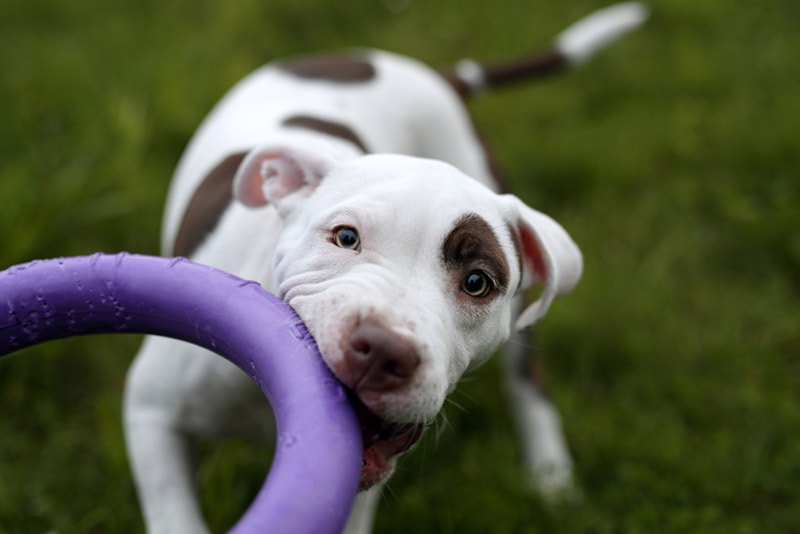
Both puppies and adult dogs need to chew. Providing your puppy with puppy-safe chew toys and teething toys allows them to act out their natural instincts on something appropriate rather than on you or your furniture!
8. Be Consistent
Training your Pit Bull puppy to avoid biting requires consistency on your part. If you allow them to get away with biting you sometimes but not others, this sends mixed messages and causes confusion. Make sure everyone in the family is following the same bite-inhibition training routines to avoid inadvertently encouraging the behavior.
9. Reward Positive Behavior
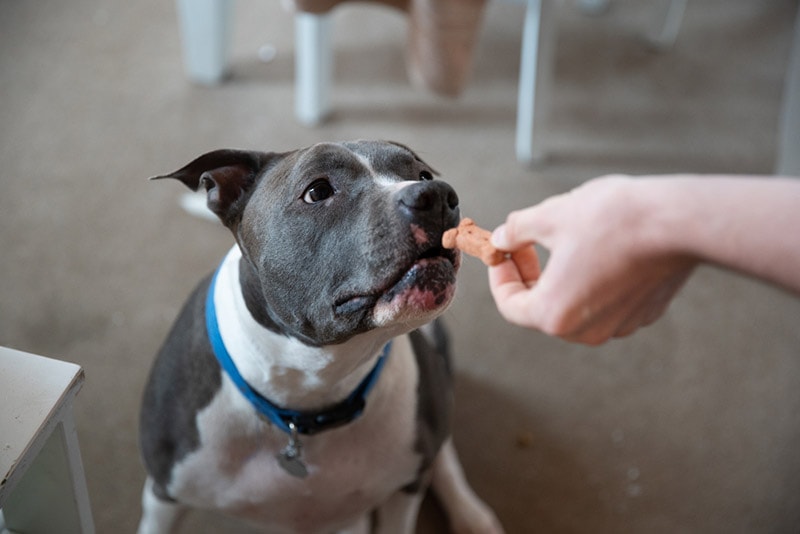
Give your Pit Bull puppy some credit when they behave appropriately. For example, if they stop biting you in response to your “ouch!” during play, reward that. If they play nicely with other dogs, praise and reward them, too.
Even if your puppy is sitting calmly on their bed, try putting a treat down in front of them. It’s easy to forget to reward the “when nobody’s watching” behaviors like simply being relaxed, but it’s just as important as rewarding elicited or encouraged behavior.
10. Recruit a Professional
Anyone who has ever parented a dog of any breed knows how hard training can be—especially if your dog doesn’t seem to be responding as you’d hoped. There’s absolutely no shame in contacting a professional trainer for help if your Pit Bull puppy is having a hard time learning not to bite.
In fact, working side by side with a professional when you’re struggling is one of the most responsible things a dog parent can do. If it helps your Pit Bull grow up into a well-adjusted adult, you’ve absolutely done the right thing.
Conclusion
When it comes to training a Pit Bull puppy not to bite, the earlier the better. Patience, consistency, and lots of positive reinforcement are key to making the training a success.
It’s a good idea, in conjunction with the bite-inhibition training you do at home, to enroll your puppy in socialization and obedience classes. This helps your Pit Bull get plenty of positive experiences with other dogs and people from a young age, which is important for ensuring they don’t respond aggressively to certain situations as adults.
- You might also like: 10 Best Collars for Pit Bulls
Featured Image Credit: Oksana Kozharina, Shutterstock


